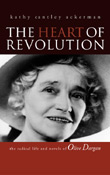The Heart of Revolution
The Radical Life and Novels of Olive Dargan

- Author(s): Ackerman, Kathy Cantley
- Series:
- Imprint: Univ Tennessee Press
- Publication Date: 2004-03-31
- Status: Active
- Available in Hardcover - Cloth: Price $29.95 | Buy Now
- Leaf eReader required for PDF ebooks
The Heart of Revolution The Radical Life and Novels of Olive Dargan
Kathy Cantley Ackerman
Despite the timeless themes of Olive Tilford Dargan’s work and the acclaim she earned with her novels Call Home the Heart (1932) and A Stone Came Rolling (1935), the author, who published her best-known works under the pseudonym Fielding Burke, has been largely forgotten by the American literary establishment. In this first book-length study of Dargan’s life and work, Kathy Cantley Ackerman poses these questions: Why did Dargan’s proletarian and feminist writings fall out of public favor when the literary climate changed in the 1940s, and what are the issues raised in and by her work that today’s readers should reconsider?
The Heart of Revolution combines biography and history with a critical reading of Dargan’s work. Ackerman pays close attention to the proletarian, feminist, and racial issues in the novels; she then examines the ways these issues intersect in the southern Appalachian and Piedmont regions. Dargan’s aesthetic, articulated in her depiction of the southern textile mill strikes of 1929 and the early 1930s, defies the party line of the period that privileged the struggle of white working men over the concerns of women and minorities. Unlike her male—and many of her female—counterparts in the proletarian movement, Dargan envisions a world in which romantic love can coexist with the fight for socioeconomic revolution, a world in which the activist does not have to surrender her individuality. Through strong female characters, she reconstructs the paternalistic, capitalistic marriage-and-mother myth, replacing it with a model based on egalitarian principles—an ideology that has only gained relevance over time.
Ackerman’s exploration of class, race, and gender in Dargan’s novels individually and her consideration of Dargan’s work as a whole reveal the complicated reasons for the novelist’s neglect and present a compelling argument for reevaluation of her fiction.
